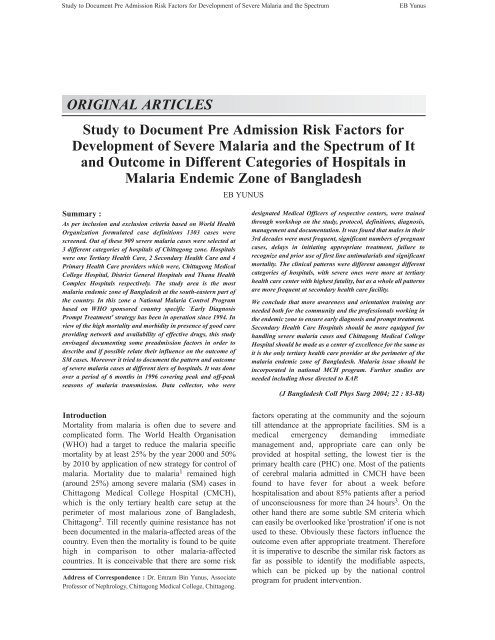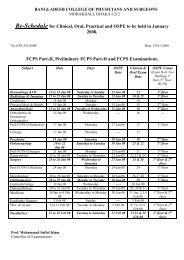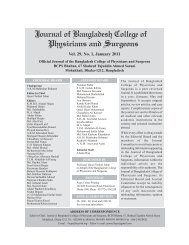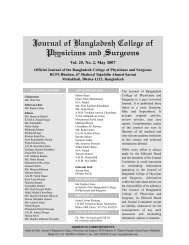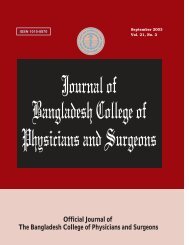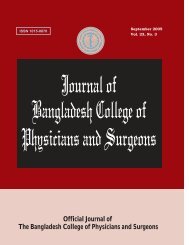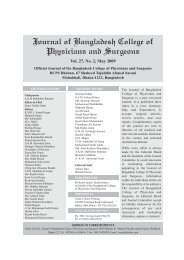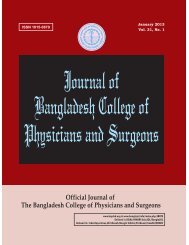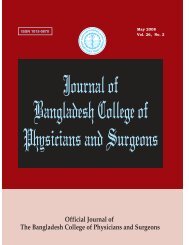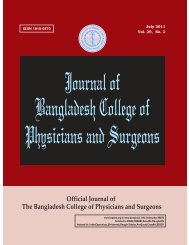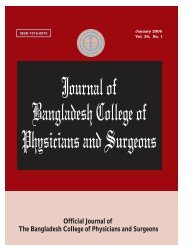September 2004 - bcps
September 2004 - bcps
September 2004 - bcps
Create successful ePaper yourself
Turn your PDF publications into a flip-book with our unique Google optimized e-Paper software.
Study to Document Pre Admission Risk Factors for Development of Severe Malaria and the SpectrumEB YunusORIGINAL ARTICLESStudy to Document Pre Admission Risk Factors forDevelopment of Severe Malaria and the Spectrum of Itand Outcome in Different Categories of Hospitals inMalaria Endemic Zone of BangladeshEB YUNUSSummary :As per inclusion and exclusion criteria based on World HealthOrganization formulated case definitions 1303 cases werescreened. Out of these 909 severe malaria cases were selected at3 different categories of hospitals of Chittagong zone. Hospitalswere one Tertiary Health Care, 2 Secondary Health Care and 4Primary Health Care providers which were, Chittagong MedicalCollege Hospital, District General Hospitals and Thana HealthComplex Hospitals respectively. The study area is the mostmalaria endemic zone of Bangladesh at the south-eastern part ofthe country. In this zone a National Malaria Control Programbased on WHO sponsored country specific `Early DiagnosisPrompt Treatment' strategy has been in operation since 1994. Inview of the high mortality and morbidity in presence of good careproviding network and availability of effective drugs, this studyenvisaged documenting some preadmission factors in order todescribe and if possible relate their influence on the outcome ofSM cases. Moreover it tried to document the pattern and outcomeof severe malaria cases at different tiers of hospitals. It was doneover a period of 6 months in 1996 covering peak and off-peakseasons of malaria transmission. Data collector, who weredesignated Medical Officers of respective centers, were trainedthrough workshop on the study, protocol, definitions, diagnosis,management and documentation. It was found that males in their3rd decades were most frequent, significant numbers of pregnantcases, delays in initiating appropriate treatment, failure torecognize and prior use of first line antimalarials and significantmortality. The clinical patterns were different amongst differentcategories of hospitals, with severe ones were more at tertiaryhealth care center with highest fatality, but as a whole all patternsare more frequent at secondary health care facility.We conclude that more awareness and orientation training areneeded both for the community and the professionals working inthe endemic zone to ensure early diagnosis and prompt treatment.Secondary Health Care Hospitals should be more equipped forhandling severe malaria cases and Chittagong Medical CollegeHospital should be made as a center of excellence for the same asit is the only tertiary health care provider at the perimeter of themalaria endemic zone of Bangladesh. Malaria issue should beincorporated in national MCH program. Further studies areneeded including those directed to KAP.(J Bangladesh Coll Phys Surg <strong>2004</strong>; 22 : 83-88)IntroductionMortality from malaria is often due to severe andcomplicated form. The World Health Organisation(WHO) had a target to reduce the malaria specificmortality by at least 25% by the year 2000 and 50%by 2010 by application of new strategy for control ofmalaria. Mortality due to malaria 1 remained high(around 25%) among severe malaria (SM) cases inChittagong Medical College Hospital (CMCH),which is the only tertiary health care setup at theperimeter of most malarious zone of Bangladesh,Chittagong 2 . Till recently quinine resistance has notbeen documented in the malaria-affected areas of thecountry. Even then the mortality is found to be quitehigh in comparison to other malaria-affectedcountries. It is conceivable that there are some riskAddress of Correspondence : Dr. Emram Bin Yunus, AssociateProfessor of Nephrology, Chittagong Medical College, Chittagong.factors operating at the community and the sojourntill attendance at the appropriate facilities. SM is amedical emergency demanding immediatemanagement and, appropriate care can only beprovided at hospital setting, the lowest tier is theprimary health care (PHC) one. Most of the patientsof cerebral malaria admitted in CMCH have beenfound to have fever for about a week beforehospitalisation and about 85% patients after a periodof unconsciousness for more than 24 hours 3 . On theother hand there are some subtle SM criteria whichcan easily be overlooked like 'prostration' if one is notused to these. Obviously these factors influence theoutcome even after appropriate treatment. Thereforeit is imperative to describe the similar risk factors asfar as possible to identify the modifiable aspects,which can be picked up by the national controlprogram for prudent intervention.


